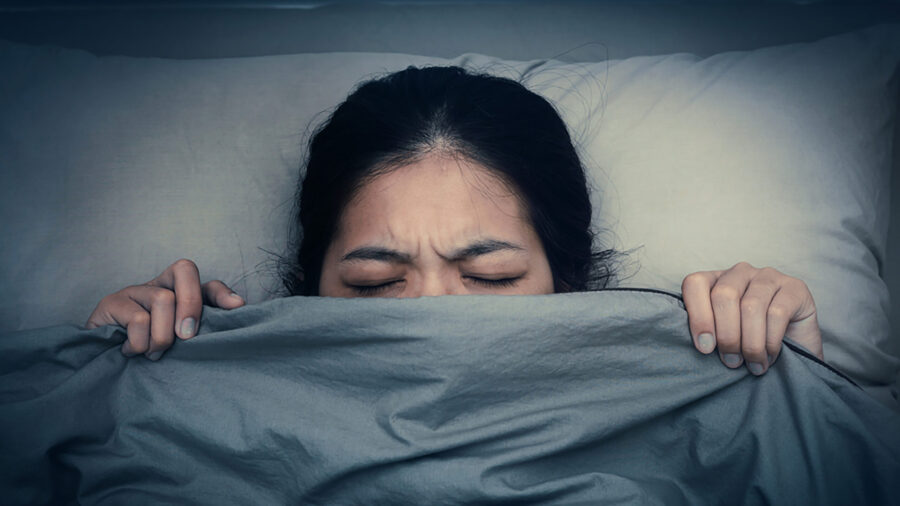Sleep problems linked to fivefold rise in stroke risk, study says
Apr 5, 2023, 3:00 PM | Updated: 3:02 pm

Asian woman unable to fall as sleep. Asian girl having trouble with getting up early in the morning, Nightmare.; Shutterstock ID 416975215; Job: CNNie Design Website
(CNN) — Snoring, snorting, tossing and turning, napping for a long time during the day, waking up during the night, and sleeping too little or even too much all contribute to poor-quality sleep and may raise your risk for stroke, according to a new study.
In fact, researchers found the more sleep problems you have, the greater the risk of stroke.
“Having more than five of these symptoms may lead to five times the risk of stroke compared to those who do not have any sleep problems,” said study author Christine McCarthy of the University of Galway in Ireland in a statement.
“The findings are consistent with prior research linking unhealthy sleep to high blood pressure and to impairments to blood vessels, which are risk factors for stroke,” said sleep specialist Kristen Knutson, an associate professor of neurology and preventive medicine at Northwestern University’s Feinberg School of Medicine in Chicago. She was not involved in the study.
One reason may be the impact of short, fragmented sleep and sleep disorders such as sleep apnea on the body’s ability to regulate metabolism, blood pressure and inflammation, which are all risk factors for stroke, said Dr. Phyllis Zee, director of the Center for Circadian and Sleep Medicine at Northwestern’s medical school, who was not involved in the study.
“Poor sleep can impair the natural blood pressure dipping that occurs during night time sleep and contribute to hypertension — an important risk factor for stroke and cardiovascular disease,” Zee said via email. “In other population based research, similar relationships have been reported between poor sleep health and disorders such as diabetes, heart disease and dementia.”
Sleep problems and stroke risk
The study, published Wednesday in the journal Neurology, analyzed data from more than 4,500 people participating in INTERSTROKE, a large international case-control study of patients who have experienced a stroke.
Nearly 1,800 participants in the study had an ischemic stroke, the most common kind, in which a blood clot blocks an artery leading to the brain. Another 439 people had an intracerebral hemorrhage in which arteries or veins in the brain rupture, causing bleeding into brain tissue.
Participants in the study were then matched by age and sex to people who had no history of stroke. Both groups answered questions about their sleep quality and behavior, and the two groups were compared.
Results showed people who slept less than five hours a night on average were three times more likely to have a stroke than those who got seven hours of sleep — the recommended minimum for adults.
On the flip side, sleeping more than nine hours a night on average was associated with a twofold increase in stroke risk, according to a statement on the study.
The results held true even after adjustments to eliminate other issues that can lead to stroke, including depression, alcohol abuse, smoking and a lack of physical activity, according to the study.
Having sleep apnea — a condition in which people stop breathing multiple times per hour — was associated with a threefold increase in stroke risk, the statement said.
“Sleep apnea can alter the pathways involved in the regulation of coagulation factors that can increase the risk of strokes,” Zee said.
Snoring or snorting, which can both be signs of untreated sleep apnea, were also risky. People who snored were 91% more likely to have suffered a stroke, while those who snorted were almost three times as likely to have had a stroke than those who did not.
Napping was also a risk factor, the statement said. People who on average napped more than an hour were 88% more likely to suffer a stroke than those who did not. However, taking a planned nap of less than an hour was not associated with an increased stroke risk, the study said.
It’s important to note that the research could only show an association between sleep problems and stroke, not causation, said Dr. Andrew Freeman, director of cardiovascular prevention and wellness at National Jewish Health in Denver.
“The question remains: Is poor quality sleep causative? Or is it simply associated with a cluster of bad health habits that would lead somebody to have a higher stroke risk?” asked Freeman, who was not involved in the research.
“Are they under a lot of stress? Are they drinking huge amounts of caffeine and then not sleeping? Maybe they’re not exercising very much, and we know that exercise promotes good quality sleep,” Freeman said. “It’s hard to tease out all the factors that might contribute.”
What to do
Practicing good sleep hygiene, eating a healthy diet and getting regular exercise are all key ways to reduce the negative impact of sleep disorders and reduce stroke and cardiovascular risk, Freeman said.
“What I always tell people is, you know, getting about seven hours a night of uninterrupted sleep is associated with the least amount of cardiovascular disease,” he said.
It’s important to prioritize getting those seven to eight hours of uninterrupted sleep each night on a regular basis, Zee said. Doing so means going to bed and waking at the same time every day, even on weekends.
“Regular exposure to light in the morning and afternoon can also improve sleep quality,” she said, adding that anyone suffering from snoring, insomnia or excessive sleepiness during the day should talk to a sleep specialist.
The bedroom should be used for sleeping and intimacy only, Freeman added.
“Don’t hang out in there and watch TV or read books or do work in there,” he said. “Keep a notebook next to the bed so if you wake up in the middle of the night you can write down what comes to mind. Diffuse any worries you have by meditating on it and do your best to let things go.”
Don’t drink alcohol or eat at least three hours before bed to avoid gastric distress that might wake you up, Zee suggested.
“It’s also important to exercise, preferably in the morning,” Freeman added. “The one true medicine that works always is improving one’s lifestyle to include healthy behaviors.”
The-CNN-Wire™ & © 2023 Cable News Network, Inc., a Warner Bros. Discovery Company. All rights reserved.













